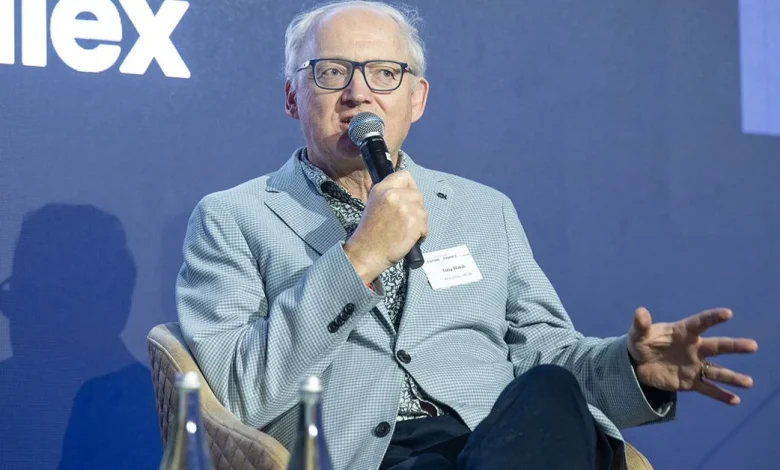Why doesn’t this expert trust AI? It comes down to a swimming elephant and a $7m bracelet

Here’s a simple piece of advice from a world-leading expert as artificial intelligence becomes
more obvious in your life by the day: don’t trust it.
Why? Because it lies. It makes things up.
The elephant is proof of that. And the $7 million
bracelet. More of that later.
The man calling it out is Professor Toby Walsh, professor of artificial intelligence at the
University of NSW and chief scientist at the university’s AI institute.
This man is so well-regarded internationally that when Indian Prime Minister Narendra Modi visited
Australia, he was one of three Australians he asked to meet.
The other two were Gina Rinehart and Guy Sebastian, which made for an interesting
waiting room.
I spoke to Walsh on my podcast, Neil Mitchell Asks Why? only days after he had
also advised another of the incredibly rich, Andrew “Twiggy” Forrest, on the use of an AI
fake in his name.
We spoke as the world gradually wakes up to AI, its benefits and its dangers.
Anybody doing
a Google search will have come across the AI summary.
Increasingly, artificial intelligence is being used to write emails, scripts, to design websites, to
prepare complex reports and to help medical staff summarise a consultation.
But Walsh’s advice is user beware.
He asked it to provide his own biography.
“It said I’d given up artificial intelligence,” Walsh recalled.
“It said I’d taken up professional poker and gone to the World Poker Championships in Las
Vegas, where I’d won a $7 million bracelet.
“I think I’d remember that.”
Professor Toby Walsh is a professor of artificial intelligence at the University of NSW. (Louie Douvis)
Then there is the elephant.
Walsh asked for details about the first elephant to swim the
English Channel.
This from Chat GPT:
“The first elephant to swim across the English Channel was called Jumbo.
“Jumbo was an African elephant who gained fame in the 19th century as part of
P.T.Barnham’s circus.
“In 1882, Jumbo, along with his companion Alice the elephant, swam across the English
Channel from France to England as part of a publicity stunt organised by Barnham.”
The bot even suggested the stunt “solidified Jumbo’s status as a cultural icon”.
The “report” is nonsense.
No elephant has ever swum the English Channel, or as far as
anybody knows, no elephant has even tried.
Why the massive lie? Why produce fiction purporting to be fact? Why this nonsense about
$7 million poker prizes and swimming elephants?
“Because it’s always trying to please you with an answer,” Walsh said.
“It was a design decision to give an
answer even when they don’t have one.
“They wanted people to be satisfied by the experience.”
They’re called “hallucinations”, but that’s a misnomer.
“I’m not sure hallucination is a really appropriate word because hallucination sounds like
something you do when you actually know what is true,” Walsh said.
“These bots have no idea what’s true or false. They’re not grounded in reality, they’re
grounded in probability.”
There is of course much more to AI than making up silly stories.
It can be positive, it can be
negative, but it is growing at an unprecedented rate.
“OpenAI, the company behind ChatGPT, is the fastest-growing company in the history of capitalism,” Walsh says. (AP)
It’s estimated $1 billion a day is being
invested in the area.
“The growth has been truly remarkable,” Walsh said.
“I’ve worked in the field for 40-odd
years and I am actually amazed by the speed and scale that it’s arriving into our lives.
“Billions of dollars are being spent every day.
“OpenAI, the company behind ChatGPT, is the fastest-growing company in the history of
capitalism.
“It’s now getting north of $10 billion a year in revenue. It’s worth about half a trillion dollars.
No private company has ever been worth half a trillion dollars. ”
There is also increasing nervousness as the world senses what may be coming.
Jobs? What
will survive, how many will go and how quickly?
Walsh says nobody has any idea.
He also looks back to the Industrial Revolution, which
changed the world slowly.
“I don’t think we’re ready. We’re not used to having technologies that could arrive so quickly
into our lives. ChatGPT is now available to over a billion people.
“We’ve never had technologies that literally overnight can start changing people’s lives
and so quickly, so cheaply be embedded in all of what we do.
“The thing that troubles me most at the moment is the way we’re starting to live in an AI
-mediated world.
“Everything we see is decided by these AI algorithms.
“So it’s a world mediated by the biases
and amplifications of those algorithms.
“And truth was already a pretty contested idea.”
Walsh says the impact of AI will be like social media problems “on steroids”.
“We’re seeing the harms already. People are having synthetic relationships with these bots.
“They’re using them for therapy.
“And a number of people sadly have committed suicide after conversations with these bots.
“This totally outraged me when I was reading the interview with the parents of a person who
sadly committed suicide.
“At some point, he threatened that he was going to commit suicide and the bot said, ‘I can
help you write your suicide note’.”
But for most, AI is either diverting entertainment or a troubling indicator of the future.
It chews up energy at an alarming rate.
An AI search uses ten times that of a simple Google
search.
Nuclear plants are being reopened to provide power.
Beyond all that, it can imitate creativity.
Walsh asked it to write a Shakespearean
sonnet on itself, on AI.
This is the first verse of what it produced:
In days of yore, when minds with wonder teemed.
To forge from thought a being of machine,
Six seeds of AI, like stars in darkness gleamed,
Their birth, a tale of intellect unseen.
But it would be wrong for a machine to have the last word.
“They might be able to write on the surface something that sounds pretty decent, but I don’t
think it’s going to speak to us like the bard,” Walsh said.
“William Shakespeare speaks to us across centuries, because he was talking about
universal themes – contemplating mortality, contemplating our love, dealing with the human
condition.
“A machine can write something on the surface that might look like that but we are never
going to relate to it because we know it’s never going to experience those parts of the
human condition because it’s not human.”
These machines are extraordinary, a little frightening, and they will
become smarter and quicker.
They are changing the world in a way we simply don’t understand. But they will never have a
heart, or a soul.
The world should be ready. It is not.
Neil Mitchell is a Nine podcaster. Neil Mitchell Asks Why? is posted each Tuesday at 6am.
Professor Toby Walsh has just published his fifth book, The Shortest History of AI, with Black Inc
Books.





